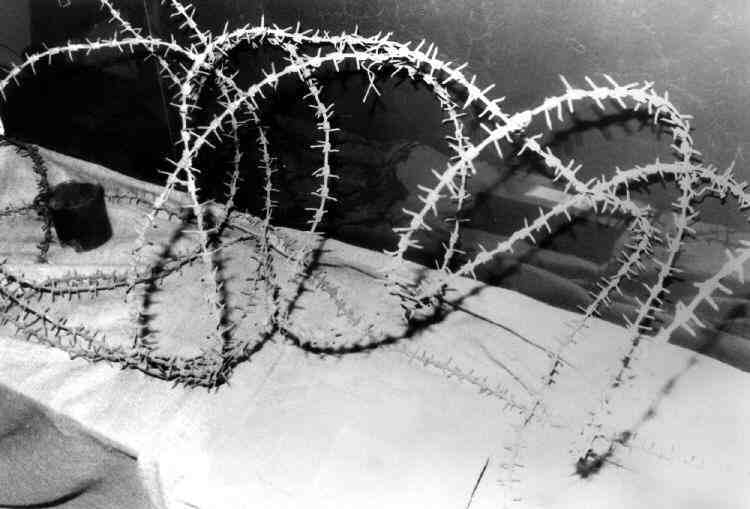|
Am 4. Mai 1945 rückte das "Public Health Team Number Two", eine Art kleine Sanitätsgruppe der amerikanischen Armee, in das Waldlager ein. Zu diesem Zeitpunkt waren die "Evakuierungstransporte" bereits abgeschlossen, die Wachmannschaften geflüchtet, ein Großteil der noch verbliebenen Häftlinge bereits nach Ampfing, Mühldorf oder Mettenheim in die Freiheit unterwegs. Nur ein Rest von etwa dreihundert Häftlingen war zu diesem Zeitpunkt noch im Waldlager verblieben - Häftlinge, die zu krank und zu schwach waren, um sich aus eigener Kraft aus dem Lager zu entfernen. In dem Bericht "Incident at Ampfing" - einer der wenigen authentischen Berichte zur Befreiung der Lager bei Mühldorf - beschreibt einer der Angehörigen der Sanitätstruppe die Zustände, die von Ihnen beim Einrücken ins Waldlager vorgefunden wurden, und welche Anstrengungen unternommen wurden, den kranken Häftlingen zu helfen und sie unter ärztlicher Aufsicht nach Ampfing zu bringen. Im folgenden finden sich einzelne wortgetreue Auszüge des Berichts. | |
We entered a wood. As in all German forests, the trees were carefully spaced, and the ground was clear of underbrush. A small metall sign on a post read „KL“ – Konzentrationslager. We drove on. Around a sudden bend in the road, a fifteen-food, triple barbed-wire enclosure loomed into view. At the top of each corner was a guardhouse equipped with searchlights. A few wooden barracks and several green silo-like structures were scattered under the trees. „Did anyone escape by climbing the trees?“ I asked because some of the branchens extended over the fence. - „Escape?“ Andre asked in bewilderment. „To where?“ |  |
| The area was deserted and silent, and the cry of a bird echoed sharply. Without the barbed wire it would have seemed an idyllic spot for a vacation. Across the road were neat wooden houses, surrounded by a barbed-wire fence. „The guards lived here“ said Andre. I felt a rush of anger, remembering Buchenwald. „Did the comrades get many of them?“ Andre shrugged his shoulders again, a motion combining ignorance with the feeling that it was of no importance. „They got out fast. Had time to kill only a few comrades, may be twenty, before they left. Perhaps some are still in the forest.“ |
„Surgical cases in here,“ said the docor. Opening the door to the large room occupying the remainder of the barrack. Here on double-deck wooden beds – mere wooden slabs covered with filthy straw – were gaunt shadows of men with shaved heads, showing their ulcerated legs, the unhealed whiplashes across their backs. They all had pale faces and puffy ankles, the protein-deficient flesh that was unable to recuperate from even minor wounds. Numbers were tattooed on their forearms or across their chests. |
|
| On both sides of a rectangular space werde triple shelves, bare wooden planks. In the center, three wooden poles supported the ceiling. At the far end a nude skeleton sat on a barrel with a plank across it. He was supported by another skeleton who was standing; rather, they leaned against each other in order not to fall down. Bloody excrement was spattered around the barrel. We walked around the planks on the muddy floor. The shelves were filled with what had been men. Their bodes were naked or only partly covered by a scrap of tattered, dirty, gray blanket. Their bodies were no more than skin stretched over bone; their knees werde the thickest portion of their legs. Their shaved heads hung limply, eyes staring out of hollow sockets, nodes abnormally prominent aigainst the fleshless faces. Muths were open, dry, red. Expresionless, animal-like creatures, they all looked alike; all individuality ahd long ago been washed out. Some had enough strength to turn and extend their heads in our direction; some just lay, staring with unseeing eyes and barely breathing. |
| We enterd four more bunkers and two corrugated iron shacks. The shelf beds were arranged a bit differently, and one iron shack had one thin blanket per man. Some of the men were not quite so emaciated; others had great sores on their legs and backs. A few that stirred around, stumbling between the central table and the bunks, had ankles swollen with edema. It was more and more the same. |
|
| Hop pointed to one of the half-dozen silo-like structures, each perhaps twenty feet in diameter, covered with a thatched roof. „What are those?“ We were led to one by Andre. A small dorr, no windoes, straw covering the floor. „The healthy ones slept in here,“ said our guide, „Fifty in each. Did not stay healthy long.“ |
Men without clothing, without hair, without flesh, sores on their legs, their kees larger in girth than their thigs, a filthy piece of blanket around their groins. They stumbled and fell as they tried to navigate the three steps into the place before some could help them.
|  |
The German women wrung their hands. „Mein Gott, mein Gott“, they mouned, and it was not an act. Two women, who had been cleaning up the hall stood transfixed. „How can it be?“ they cried and dropped their brooms to help a stumbling Jew. Mike rushed forward. „Hitler`s work. You ought to be proud of it!“, he yelled at the women in English | |




